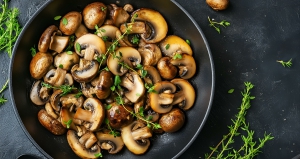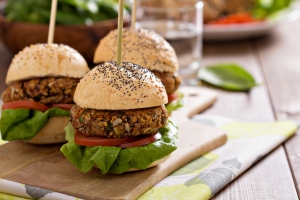Mushrooms are earth’s favorite ingredient
When it comes to sustainable eating, mushrooms are the ultimate MVP. Not only do they add savory umami flavor and rich meaty texture to your favorite dishes but their growing process has a remarkably low environmental footprint. In fact, according to a study by SureHarvest, mushrooms are considered “one of the most sustainably produced foods in the U.S.,”1 making them a perfect ingredient to celebrate Earth Month.
Small Footprint, Big Impact
Mushrooms are grown using minimal resources, so growers are able to produce millions of pounds of mushrooms on just a few acres of land.1 Soil used to produce mushrooms is made of pasteurized composted materials transforming what would be waste into nutrient-rich food. Producing one pound of mushrooms:
- Requires only 1.8 gallons of water1
- Generates only 0.7 lbs of CO2 equivalents1
- Requires only 1.0 KWH of electricity1
Once mushrooms are harvested, this soil can be repurposed in multiple ways. One way it is used is as potting soil, enriching it with beneficial nutrients and organic matter to support enhanced plant growth. This full-circle approach minimizes waste, enhances soil health and contributes to a more sustainable food system.
Healthy on the Plate, Gentle on the Planet
Mushrooms aren’t just good for the earth, they’re a superfood source of nutrients, too. A rich umami flavor and meaty texture make them a perfect plant-based pairing with vegetables, grains and proteins.
You can read this interesting article further on Mushroom Concil
Plant-based meat products served out-of-home grow by almost 50% across Europe’s ‘Big 5’ countries
- Sizzling 90% growth for plant-based burgers, while sales of sandwiches fall
- Annual consumer spend finally exceeds pre-COVID 19 levels, but visits to OOH hospitality venues remain lower at -10%
- 25% of Europe’s Big 5 population follow a flexitarian diet – a trend that is set to grow in 2024
BRACKNELL, UK – 8 November 2023 – According to research from Circana, the leading advisor on consumer complexity that formerly traded as IRI and The NPD Group, the trend towards eating alternative plant-based meat protein products in out- of-home (OOH) eateries, such as quick-service restaurants (QSR), cafes, pubs and bars has increased by 48% in servings compared to 2019 across Europe’s ‘Big 5’ countries. While in other food protein categories, the number of total product servings declined, including Beef (-5%), Pork (-16%), Chicken (-5%), Fish/Seafood (-13%) and Other Meat (-20%).
Typically made from ingredients such as soy, peas, lentils and mushrooms, plant-based products have gained popularity in recent years as fast-food chains and restaurants throughout Europe cater to growing consumer demands for sustainable, healthier and cruelty-free menu options. When asked about factors influencing their choice of where to eat out, 45% of consumers overall said they are more loyal to restaurants that care about sustainability, with Italy voicing the strongest concern (56%) followed by Spain (49%) and the UK least concerned (38%).
Burgers buck the trend
Compared with other protein categories, plant-based meat has shown the strongest growth across all formats since 2019. The overall number of servings across each protein category has dropped with one exception – burgers. While the number of servings in other formats, such as sandwiches and wraps, have declined, the burger has shown solid growth (Beef +4%, Chicken +16%, Fish +11%, Other Meat +14%).
Despite the overall decline in visits to OOH venues, plant-based burgers grew significantly by +90% during year ending August 2023 vs 2019, and +20% year-on-year ending Aug 2023, representing a quarter (25%) of the total contribution made to growth in burgers.
Please read the full article here.
Source photo: Kent Wild Life Trust
Plant-based mushroom innovation sees the light
Growing mushrooms above ground and sprouting soybeans are two entrepreneurial efforts looking to make plant-based protein ingredients more nutritious, affordable and sustainable.
Mush Foods, Ltd., Rehovot, Israel, a portfolio company of the Strauss Group Kitchen FoodTech Hub founded in 2021, now offers a 50CUT mycelium protein ingredient system to reduce the animal protein content in meat products by 50%, said Shalom Daniel, co-founder and chief executive officer of Mush Foods. The ingredient requires no agricultural land and uses minimal energy and water, according to the company. Cultivation does not depend on season or climate.
A binder and whole protein, the mushroom mycelium needs no added binders and offers an umami flavor and a fleshy meat-like texture as well as fiber, vitamins and minerals, Mr. Daniel said.
The company so far has developed 50CUT beef and 50CUT chicken. Pilot plants will be built in the United States. Company plans are to launch sales in the first quarter of 2024.
Read the full article here.
Source: Food Business News
Oakfield Champignons BV wants to grow exotic mushrooms as sustainably and circularly as possible. This starts at CNC Grondstoffen where the substrate is produced and ends at a cow shed where the residual flows are used as bedding.
Exotic mushrooms are increasingly appearing on retail shelves. For example, Albert Heijn has included king oyster mushrooms from mushroom grower Oakfield Champignons in its range.
The process from the formation of the substrate to the harvest of the mushrooms can be seen in below video (in Dutch).
Original Dutch article
Oakfield en CNC vinden duurzame route in exotische paddenstoelen
Oakfield Champignons BV wil de kweek van exotische paddenstoelen zo duurzaam en circulair mogelijk uitvoeren. Dat begint bij CNC Grondstoffen waar het substraat wordt geproduceerd en eindigt bij een koeienstal waar de reststromen als bedding worden gebruikt.
Exotische paddenstoelen duiken steeds vaker op in de schappen van de retail. Zo heeft Albert Heijn koningsoesterzwammen van paddenstoelenkweker Oakfield Champignons opgenomen in het assortiment.
Het proces vanaf de vorming van het substraat tot de oogst van de paddenstoelen is te zien in deze video.
Source: ‘Food & Agribusiness/Misset Doetinchem’.























